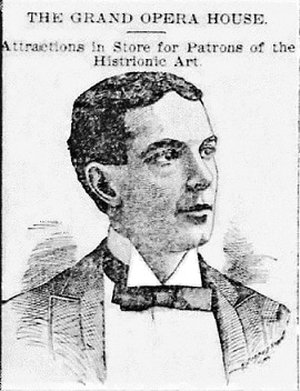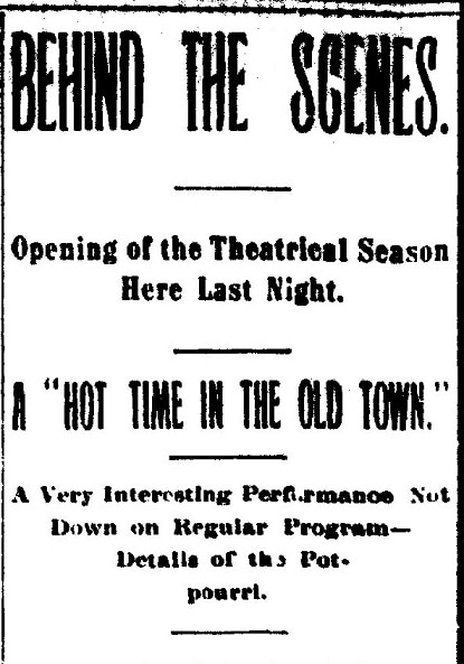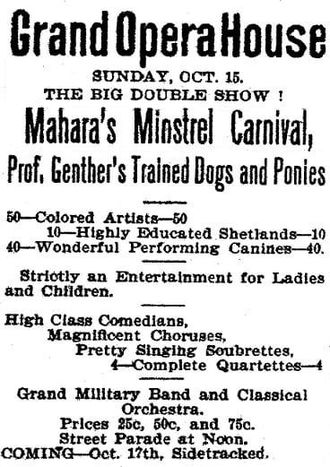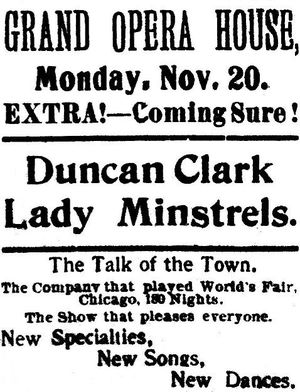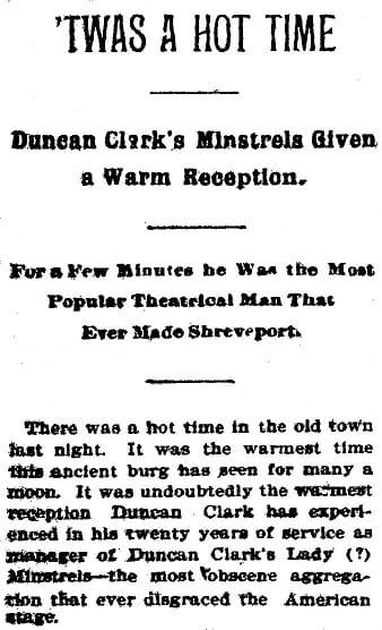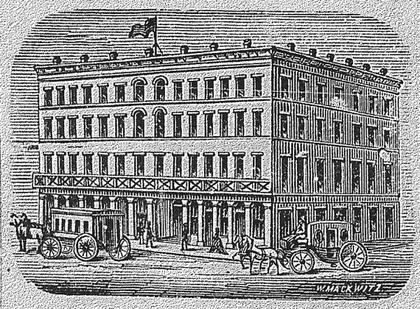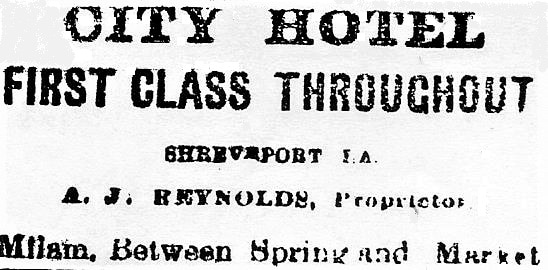A Shake-Up at the Grand
|
In June, 1898, roughly five weeks before William Christopher O'Hare traveled to New York City to promote his 1898 Witmark compositions, Shreveport's Grand Opera House began undergoing major changes. Leon Carter, the original manager, was replaced by Sol Davis of Galveston, for the past two years manager of the Paris Grand Opera House--Paris, Texas, that is.
In August, while O'Hare was still in New York, the Shreveport Times announced an additional change: An entirely new orchestra will furnish music this season. Prof. T. E. McCann and wife, of Boston, will be at the head of the new musical organization which is now being filled up with the best talent to be had in this city. |
The new season opened September 2 with a combined show of Cleveland's Massive Minstrels and George Wilson's Model Minstrels, two of Shreveport's favorites. Newspapers would not announce O'Hare's return from New York until two days later.
Exactly how changes at the Grand affected O'Hare's permanent departure is uncertain. However, O'Hare and McCann appear to have been on good terms, sometimes performing together at local events and possibly even sharing duties at the Grand.
- Although some of Shreveport's newspaper microfilms from 1899 and 1900 are extremely dark and largely illegible, a partially legible article describes a party given by the Hebrew Benevolent Society in May 1899. At the event, a vocalist, O'Hare on piano, McCann on violin, and a local woman on flute were described as "making a most harmonious quartette."
- In mid-November 1899, W. C. O'Hare and T. E. McCann performed together at the Grand Opera House during a farewell concert for Miss Ruby Roseman, described as having a beautiful singing voice. In the detailed program for this event, O'Hare served as Music Director and accompanist while McCann's orchestra provided music. While O'Hare might have stayed on temporarily as Music Director, more likely he directed only this event. Following McCann's arrival, no other mentions of him as Director at the Grand have been found.
- Oddly, given the frequent newspaper attention devoted to O'Hare's Grand Opera House work over the years, newspapers rarely mentioned McCann's work there, instead paying more attention to his orchestra's performances at dances, parties, and store promotions. No evidence has been found of his directing music for amateur productions as O'Hare had done.
Problems Under Sol Davis' Management
During the 1898 and 1899 seasons, the Grand Opera House went through several difficult times under new manager Sol Davis,
Opening Night Fight between Davis and Cleveland
|
Although Manager Davis' opening night was said to have been an attendance success, Cleveland of Cleveland's minstrels called in the Chief of Police early in the show because he contended that Davis had given 55 free tickets to friends whereas the contract stipulated no more than 30. Apparently fearing that the show would be cut short, Manager Davis demanded that Cleveland not begin removing any of the show's trunks until the show ended. The train taking the minstrels to their next venue had agreed to wait an hour for them, but catching the train would mean an immediate departure after the show.
The big fight began backstage as the last act commenced. With Cleveland still claiming that Davis had cheated the performers and Stage Manager Ehrlich wielding a pipe to prevented Cleveland and others from removing trunks, Chief Nelson and Officer Harkey rushed backsageas did Davis' friends and "the usual avalanche of the curious." With Davis insisting that Cleveland be arrested for his stream of invectives, the noise level was such that audience members could hear the backstage hubbub over the performance. With Cleveland help over to appear in court the next morning, he and Davis were both available to talk to the arriving press in search of a big story. With both Davis and Wilson of the combined Cleveland-Wilson show, trying to keep the row out of the papers, Cleveland insisted that Davis had tried to "job" the minstrels from the start--that Davis's treatment of the minstrels and been a "shakedown." Cleveland further insisted that the minstrels had visited Shreveport many times under previous management and "never had there been any trouble of any kind with his people or contracts." |
Sol Davis's opening night 1898 had turned into a noisy brawl that would long be remembered.
Mahara's Minstrel Band's "Sunday Desecration"
Although willing to tolerate Sunday performances at the Grand, a Shreveport Times writer insisted that matters had gone too far when the famed Mahara's Minstrels' band engaged in "Sunday desecration" by parading past local churches during mid-October 1899 worship services:
"If Sunday theatricals are absolutely necessary for certain classes of people, we believe in letting them have them. If any injury is done it is confined to the people who choose to attend, but we do not see the need of a Sunday street parade and the enforcement of an annoyance upon the good people of Shreveport. |
"Hen Fruit" for Duncan Clark's "Lady (?)" Minstrels
|
A month later, the new opera house manager brought down the wrath of the local press for booking Duncan Clark's Lady Minstrels, described as "the most obscene aggregation that has ever disgraced the American stage." According to the Shreveport Times, Duncan Clark "came here honestly representing the show to be just what is was. Manager Davis engaged it, knowing it to be just what it has been for a number of years."
Manager Davis boasted that the show was "rich, rare, and racy." When asked if Davis really intended. As the Times reported, "four brazen-faced harlots came upon the stage and violated city ordinances which restricted such actions to certain prescribed districts of the city"--no doubt, a reference to the legal red-light district. When the audience demanded that the woman exhibit decency, "they had nothing to give the public." When their manager, Duncan Clark, stepped forward to explain, out came the "hen fruit." |
Eggs to the right of him, eggs to the left of him, eggs from in front of him volleyed and thundered, and the manager did some of the most artistic dodging in the history of his career. In fact he fairly covered himself with glory. . . . |
This wasn't the first time Davis had been accused of impropriety. Within six months of assuming management of the Paris Grand Opera House, local police had arrested him:
For posting show bills upon which the figures of women in tights were displayed, Sol Davis was arrested at Paris, Tex, Wednesday.
Other Complaints against Manager Davis
Although the next day's paper began with complaints about Duncan Clark's Lady Minstrels and condemnation of Sol Davis' choice to book them, it lapsed into general criticism. "The indignation of the public against the present management is not alone the result of the occurrence of Monday night," the paper explained. "They have been imposed upon to such an extent that the regular theater goers have forgotten what the word 'accommodation' from that source means." It condemned Manager Davis' stinginess illustrated by his turning off the "beautiful gas and electric chandeliers and the clusters of incandescents which form a part of the house" and replacing them with a little individual 10-candle power globe" suspended from a cord and "glimmering in its yellowness and loneliness." It argued that Shreveporters attended the theater in greater numbers than did residents of any other town around, only to have Davis schedule the best shows for Sunday nights in order to cut booking costs although it meant that many people who wanted to attend were unable to do so due to work the next day.
The Need for Repairs
Not only had these events and changing practices aggravated locals, the Grand needed repairs. One November night's incident emphasized that point. Crumbling plaster fell from the ceiling onto those seated below. Fearful that the ceiling would collapse, the audience stampeded toward the doors, clogging aisles and exits, and trapping them inside. When a fast-thinking stage manager instructed the orchestra to play Hot Time, frightened theater-goers realized the danger had passed, and the music enticed them to return to their seats. The production continued.
O'Hare had almost certainly begun questioning his earlier declaration that he would always remain in Shreveport. He last appears in the 1900 Shreveport city directory, living with his family at the City Hotel, touted as "the most convenient First-Class Hotel in Shreveport."
For the first time, the directory lists O'Hare's occupation as "composer." The change in occupation and residence may have been due, at least in part, to his recent successes. His less frequent appearance in city papers might also indicate that he was devoting more time to composing and less to the Grand, perhaps even dividing his time between Shreveport and another place or places.
For the first time, the directory lists O'Hare's occupation as "composer." The change in occupation and residence may have been due, at least in part, to his recent successes. His less frequent appearance in city papers might also indicate that he was devoting more time to composing and less to the Grand, perhaps even dividing his time between Shreveport and another place or places.
Only a few later Shreveport newspaper items have been located concerning O'Hare's remaining time in Shreveport. Based on what has been found, family issues may also have contributed to his move to New York. These more personal items, including the final mysterious one, appear in the next section, "Marriage & Family>Lottie Slater."
Background image, top of page: Close-up of the Grand Opera House, Shreveport
